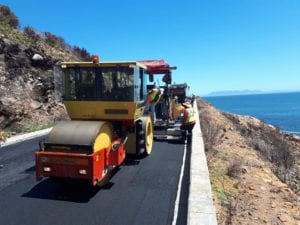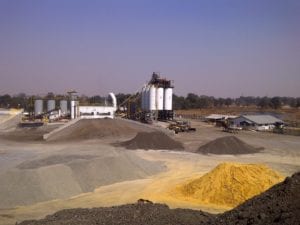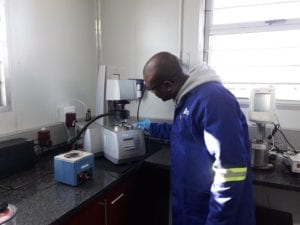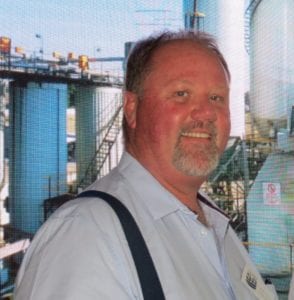IMIESA speaks to Bennie Greyling, managing director of Much Asphalt, about current and future opportunities as the company repositions itself for local and international expansion, and potential product diversification.
What changes does Much Asphalt expect following your recent acquisition by AECI from Capitalworks for R1 988 million?
 BG There will be no significant strategic or operational changes in the South African environment. Our brand and strategy will remain as they are, as will our commitment to providing customers with the best-quality products and services. Our values are very well aligned with AECI’s, so no step-change is necessary in that regard either.
The most noteworthy shift, and an exciting one for us, may be focused on markets outside South Africa’s borders. This is one area where we believe we can benefit from AECI’s extensive footprint and experience on the continent.
AECI stated that the acquisition was based on Much Asphalt having a market-leading position with long-established customer relationships, a robust order book and project pipeline, and a highly experienced management team. What benefits do you envisage?
Some synergies with companies in the AECI Group will be explored. This could provide Much Asphalt and our subsidiary, SprayPave, with opportunities to develop new chemical products to diversify our offering and expand our client base. In addition, AECI has a strong balance sheet and thus the ability to support future potential value-adding projects that generate benefits for the business and its clients.
BG There will be no significant strategic or operational changes in the South African environment. Our brand and strategy will remain as they are, as will our commitment to providing customers with the best-quality products and services. Our values are very well aligned with AECI’s, so no step-change is necessary in that regard either.
The most noteworthy shift, and an exciting one for us, may be focused on markets outside South Africa’s borders. This is one area where we believe we can benefit from AECI’s extensive footprint and experience on the continent.
AECI stated that the acquisition was based on Much Asphalt having a market-leading position with long-established customer relationships, a robust order book and project pipeline, and a highly experienced management team. What benefits do you envisage?
Some synergies with companies in the AECI Group will be explored. This could provide Much Asphalt and our subsidiary, SprayPave, with opportunities to develop new chemical products to diversify our offering and expand our client base. In addition, AECI has a strong balance sheet and thus the ability to support future potential value-adding projects that generate benefits for the business and its clients.
Can you comment on conditions in the road construction market?
Conditions are challenging, partly as a result of the hiatus in Sanral work pending clarity on funding policy. Other reasons for delays in getting projects off the ground include community engagement issues in areas where work has been scheduled and contractual disputes initiated by unsuccessful bidders on certain projects.How do you mitigate the impact of difficult conditions?
Much Asphalt’s single biggest differentiator is our nationwide geographic footprint. This means that our revenue stream is generated across South Africa and is also less dependent on seasonal influences. On the one hand, delays in the awarding of major Sanral projects are affecting the road building industry and hence the asphalt business in Gauteng – traditionally our strongest market. On the other hand, the Western and Eastern Cape are delivering better than usual opportunities. How is the slowdown in Sanral business affecting the road building sector?
How is the slowdown in Sanral business affecting the road building sector?
Sanral is a well-established, professional provider of road construction work that compares well with any of its first-world peers. Much Asphalt is proud to be involved in Sanral projects, which can represent anything from 15% to 40% of our order book.The reduction in contracts awarded by Sanral in recent months is impacting the construction sector severely, which has a knock-on effect for us. Apart from what we have seen in the past six months in terms of the fortunes of the large construction companies, small- and medium-sized suppliers to the sector have also been impacted and many jobs have been lost.
However, I am confident that the issues are being addressed urgently and professionally and that an increased flow of work will follow.What is Much doing to prepare for future demand and keep ahead of the curve?
We continually upgrade and modernise our plants to meet future demand for larger quantities, more projects and increasingly sophisticated and diverse products, as well as adhering to stringent environmental requirements. A notable example is the current expansion of our Eerste River plant in the Western Cape in preparation for major projects in the pipeline. Importantly, we have revamped our Benoni and Eerste River quality control laboratories this year and added new state-of-the-art equipment in line with international developments and trends. Our laboratories need to be reassessed continually to ensure we are ready to provide optimal quality control for existing and new asphalt products required by our clients. Together with others in the industry, we also play a significant role in developing and testing new products.
Importantly, we have revamped our Benoni and Eerste River quality control laboratories this year and added new state-of-the-art equipment in line with international developments and trends. Our laboratories need to be reassessed continually to ensure we are ready to provide optimal quality control for existing and new asphalt products required by our clients. Together with others in the industry, we also play a significant role in developing and testing new products.







